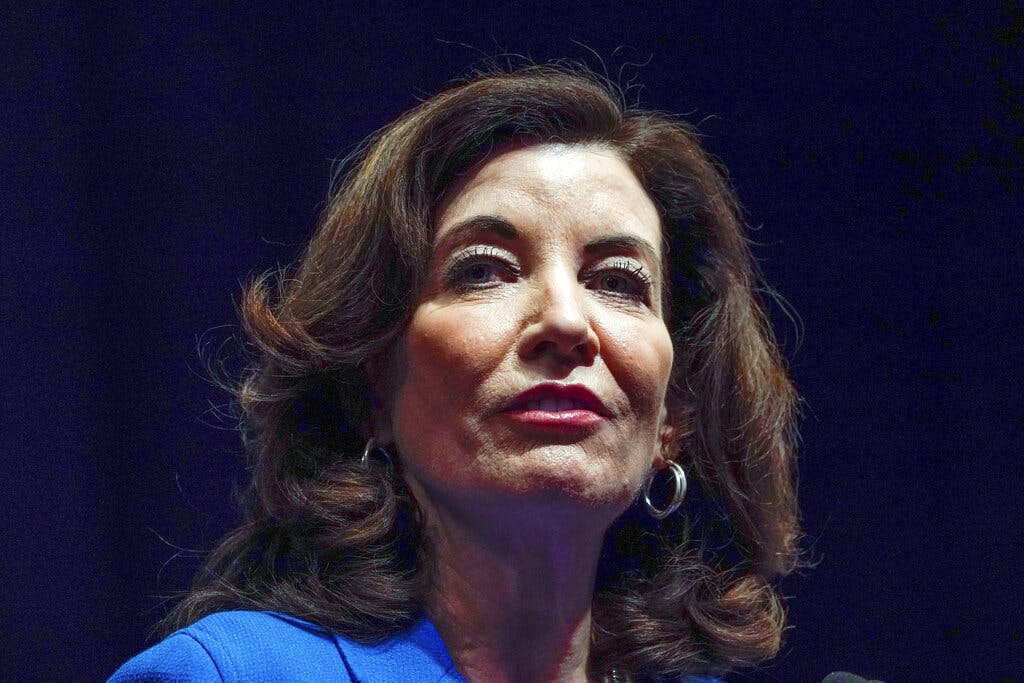Republicans Accuse Hochul of ‘Brazen Opportunism’ on Bail Reform Issue
The Albany debate over the bail law enters a new phase as the governor plans to push for changes in her budget proposal.

The bail reform debate appears to be heating up in Albany, as reports emerge that Governor Hochul will push for revisions to the bail law in the 2022 budget, in the process co-opting a key Republican talking point for the November elections.
With some blaming the increasing crime rate on the new law, which prevents judges from setting bail for certain crimes, the political fallout for its defenders could be devastating.
Analysts are divided over what the best way to move forward with bail reform. Some say increased judicial discretion must be restored, while others believe that would lead to inconsistent treatment of suspects under the law.
Republicans accuse the governor of playing politics with the issue.
“Kathy Hochul is the definition of a craven phony politician,” the New York State GOP chairman, Nick Langworthy, said in a tweet. “Her brazen opportunism is stomach-churning.”
He noted that Ms. Hochul’s stance was leaked to the New York Post the same day that Governor Cuomo advocated for changes to New York’s bail law, the latest sign that he may be angling for a political comeback after stepping down amid sexual harassment allegations.
Representative Lee Zeldin, the front-runner to be the GOP gubernatorial nominee, also had some choice words about the governor.
“Kathy Hochul has been the person doing by far the most amount of damage to block any overhaul of the state’s cashless bail law, bizarrely claiming there still wasn’t enough data,” Mr. Zeldin said in a tweet.
Since November, Ms. Hochul has publicly said that she was willing to negotiate changes to the bail law and a possible “dangerousness standard” for judges to consider with alleged offenders.
A dangerousness standard would allow judges to consider the risk that a suspect could pose to society when making decisions concerning bail and pretrial detention at an arraignment.
New York now has no such standard, but every other state “essentially … has some form of the rule,” a Manhattan Institute analyst, Charles Lehman, told The New York Sun. Of New York judges, he said: “Uniquely their hands are tied.”
Ms. Hochul will reportedly introduce a dangerousness standard for people who have been rearrested within a certain time period. She will also reportedly “set forth specific criteria on which judges will base their determinations, including criminal history of firearm use/possession.”
These reforms would theoretically target recidivism rates in an effort to drive down pretrial arrests and prevent those considered most likely to commit crimes while out on bail from doing so.
Across the state, about 2 percent of people released on bail end up committing a violent felony. The rate of general pretrial arrest — those arrested for any reason while awaiting trial — is much higher, at 22 percent.
Mayor Adams, for one, has been supportive of Ms. Hochul.
“The governor’s proposal includes significant steps, which I have advocated for, that would make New York safer, while not undoing important reforms,” Mr. Adams said in a press release.
He went to Albany earlier this year to advocate for changes to New York’s bail laws, but came away empty handed.
“It is a big step forward that these proposals are being discussed at the highest level in Albany, and I am grateful to the governor and the legislature for their partnership,” Mr. Adams added.
Mr. Lehman believes the governor’s ideas, though imperfect, are a step in the right direction for a state reeling from high-profile violent crimes.
“You want a system where the most serious offenders are kept off the streets and the less serious offenders are released or kept out of the criminal justice system entirely,” he said. “What policy will reduce crime the most varies greatly on the individual.”
Others who study criminal justice are skeptical of the effectiveness of judicial discretion as a doctrine.
“Judicial discretion is at the heart of the governor’s proposed changes to both the bail and discovery laws but if you look at the early research on bail reform the most well implemented revisions were those that did not afford such provisions,” a data analyst at John Jay College of Criminal Justice, Michael Rempel, told the Sun.
He pointed out that increased judicial discretion would likely lead to different punishments for the same crimes between different judges and in different counties. The same judge could also treat two people differently for the same crime.
“It’s oftentimes assumed that judicial discretion is good but the evidence doesn’t always show that,” Mr. Rempel said.
Whether any of the governor’s proposals become law depends on the state legislature. Although polling shows about two-thirds of New Yorkers support some change to the law, the legislature has resisted the idea in the past.
“People want to exploit the fact that we do not want to incarcerate people because they are poor. So everything becomes quote, unquote bail reform,” the senate majority leader, Andrea Stewart-Cousins, said.
Regardless of the prospects for passage, the governor’s office stated it is committed to pushing for the proposal.
“As the Governor has said consistently …, she does not negotiate in public. We look forward to continuing to work with the legislature to deliver a budget that serves New Yorkers,” the governor’s office told the Sun.

